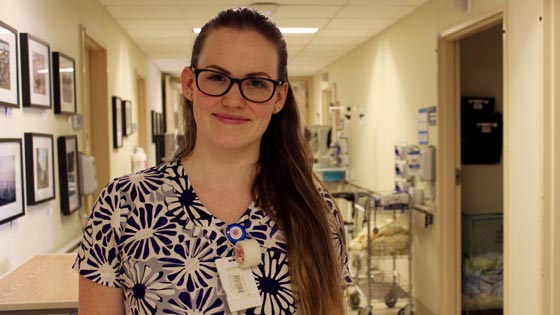
Hailey Couroux, a nurse for nearly two years, explained that helping a man after a cardiac arrest in a park was very different compared to helping patients alongside a medical team in hospital.
(Photo: UHN)
It was a warm, summer Sunday morning when Hailey Couroux was suddenly awoken from a deep sleep by her alarmed mother. Hailey, a Registered Nurse in Toronto General Hospital's General Internal Medicine unit (GIM), was urgently needed outside where someone had collapsed.
Minutes earlier, Hailey's mother had noticed a lot of unusual noise in the field behind their house. When she looked out, she noticed a man was down and the people around him were trying to perform CPR.
"She burst into my room and said, 'I think someone is in cardiac arrest!'" explains Hailey.
"I jumped out of bed, ran downstairs, and as I was about to run outside, I realized I didn't have pants on! So my mom just handed me the pyjama pants she was wearing."
The man on the ground was Alistair Kinnear. He had experienced cardiac arrest during a weekly soccer game with friends. Hailey, in collaboration with two St. John Ambulance Burlington Branch volunteers present at the game, saved Alistair's life that day.
Alistair has recovered since this incident in the beginning of July, and he is now playing soccer again.
"It's not often that one sees the community act in concert as it did the morning of my heart attack," says Alistair.
"Everyone knew precisely what to do, and did it unthinkingly. For that, my family and I will be eternally grateful. It is my hope that Hailey sees this as the strength of what we are all part of, and draws from it as she grows."
UHN News spoke to Hailey about this first-of-its-kind experience for her:
What happened when you first arrived to the scene?
"Luckily, the responders had an automated external defibrillator (AED), so they had just applied the pads when I got there."
"I then introduced myself twice and was given room to do a round of CPR for two minutes. We then shocked his heart with the AED, and did another around of CPR. When we stopped to do a pulse check, he had gotten his heart rate back and was starting to come to."
How did it feel trying to help someone whose medical situation was completely new and unknown to you?
"It was very different coming to a scene and not knowing anything about the person or what happened.
Usually, in the hospital we have some sort of history and diagnosis, and we have an experienced team that works together during a crisis. In this situation, there were only three of us with no information. It was very different."
How did you feel when you realized Alistair would survive?
"When I first saw him, there was a glimpse of hope that he was trying to breathe but he was definitely in cardiac arrest. I think the AED saved his life in combination with CPR.
Once we checked and realized he had a heartbeat, it was a huge relief for everyone."
As a nurse, you carry your skill with you everywhere you go, off-duty or not. How did it feel using your expertise like this, minutes after being awoken and subsequently helping save someone's life?
"When it was all done and I was walking back to my house, the whole soccer team started giving me a round of applause and - as humbling as it was - I felt I didn't deserve the recognition because why wouldn't I help? I just happened to be at the right place at the right time.
I wasn't thinking 'oh I saved a life today' because I know I can help so why would I not? How could I not?"
